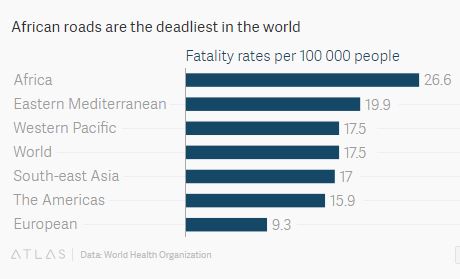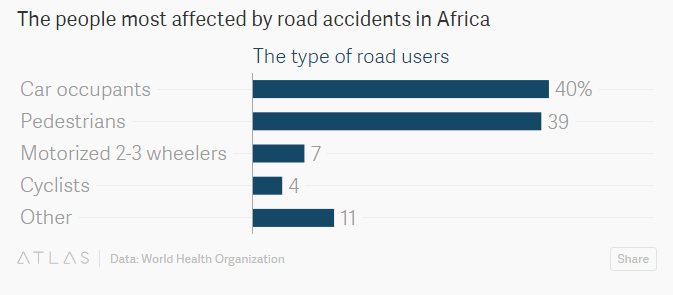How can Africa reduce road deaths?


Get involved with our crowdsourced digital platform to deliver impact at scale
Stay up to date:
Automotive and New Mobility
In Africa, there are a little under 5,000 cars for every 100,000 people. In Europe, the number is about 48,000. Yet, the number of deaths as a result of road accidents in Africa is almost three times higher than in Europe, data from the World Health Organization (WHO) show.

There are a slew of reasons why. Chief among them is a lackadaisical attitude towards traffic law enforcement, a lack of decent roads—and sidewalks for that matter. Emergency healthcare is also poor, which means you’re less likely to survive serious injury.
Most of the fatalities, unsurprisingly, involve car owners. But a significant number of those killed in road accidents are pedestrians.
With a growing consumer class on the continent, the sale of cars—the ultimate middle class status symbol—is expected to increase as well. And if there’s no serious effort to better enforce traffic laws or improve roads, more car owners will simply mean more accidents on the roads.
That is exactly what happened in countries that saw more people use motorcycles. The WHO report shows that in Tanzania, for example, registered motorcycle users went up from 46% to 54% over the last three years. Motorcycle-related deaths also rose “from 13% to 22% of [Tanzania’s] total number of road traffic deaths.”
Overall, Libya is the deadliest country for road accidents, while Seychelles boasts one of the safest records on the continent.

This article is published in collaboration with Quartz Africa. Publication does not imply endorsement of views by the World Economic Forum.
To keep up with the Agenda subscribe to our weekly newsletter.
Author: Omar Mohammed is a reporter for Quartz covering East Africa based in Tanzania’s commercial capital, Dar es Salaam.
Image: People and traffic move along a busy street. REUTERS/George Esiri.
Don't miss any update on this topic
Create a free account and access your personalized content collection with our latest publications and analyses.
License and Republishing
World Economic Forum articles may be republished in accordance with the Creative Commons Attribution-NonCommercial-NoDerivatives 4.0 International Public License, and in accordance with our Terms of Use.
The views expressed in this article are those of the author alone and not the World Economic Forum.
The Agenda Weekly
A weekly update of the most important issues driving the global agenda
You can unsubscribe at any time using the link in our emails. For more details, review our privacy policy.
More on Geographies in DepthSee all
Andrea Willige
April 23, 2024
Libby George
April 19, 2024
Apurv Chhavi
April 18, 2024
Efrem Garlando
April 16, 2024
Babajide Oluwase
April 15, 2024
Rida Tahir
April 9, 2024







